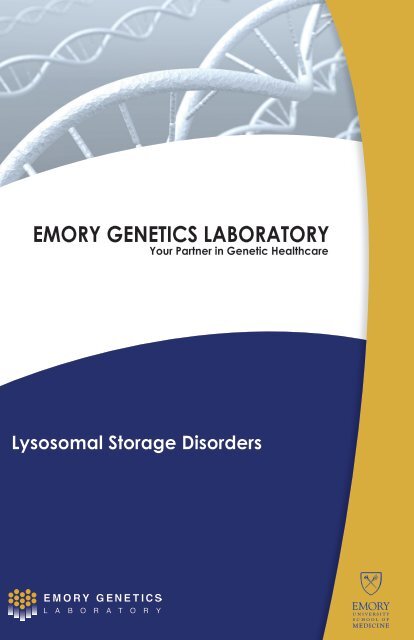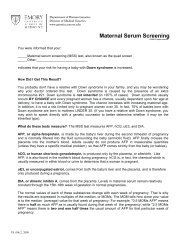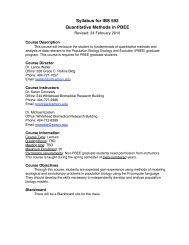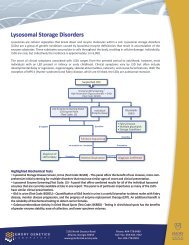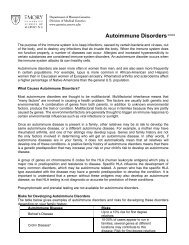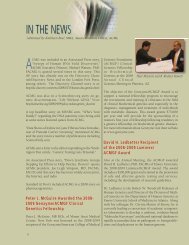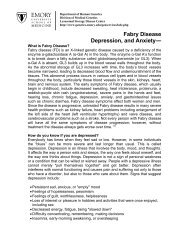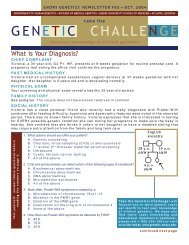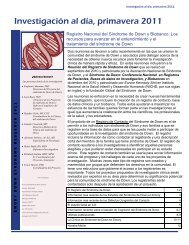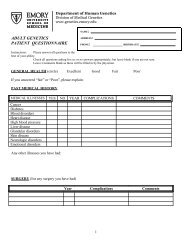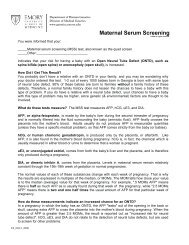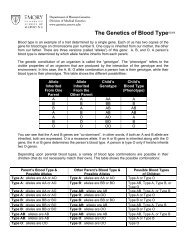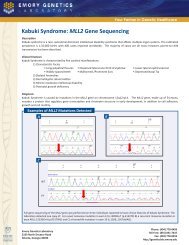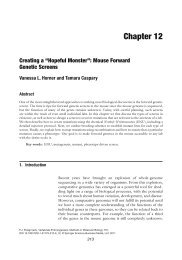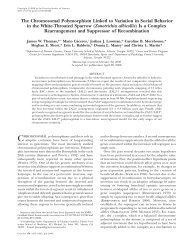EMORY GENETICS LABORATORY
EMORY GENETICS LABORATORY
EMORY GENETICS LABORATORY
Create successful ePaper yourself
Turn your PDF publications into a flip-book with our unique Google optimized e-Paper software.
<strong>EMORY</strong> <strong>GENETICS</strong> <strong>LABORATORY</strong><br />
Your Partner in Genetic Healthcare<br />
Lysosomal Storage Disorders
Emory Genetics Laboratory (EGL) is a worldwide<br />
leader with more than 35 years of experience<br />
in comprehensive genetic diagnostic testing.<br />
Our innovation and expertise in studying rare genetic<br />
conditions foster our dedication to provide the medical<br />
community with state-of-the-art tests, informative test<br />
reports and quality customer service.<br />
Our laboratory directors, genetic counselors and medical geneticists, recognized as leaders in<br />
their areas of interest, are available to discuss key issues related to diagnosis, interpretation<br />
and medical management for the conditions in our growing test menu. By integrating cuttingedge<br />
genetic testing technologies with clinical expertise, EGLprovides the quality laboratory<br />
services needed to enhance the clinical care you provide to your patients.<br />
Lysosomal Storage Disorders (LSDs)<br />
Lysosomal storage disorders are genetic conditions most often caused by a lack of an enzyme<br />
that eliminates unwanted substances in cells. Lysosomes are small sac-like structures that act<br />
as the “recycling center” of each cell, breaking down unwanted material into simple products<br />
for the cell to use to build new material. The lack of certain enzymes causes a buildup of the<br />
substance that the enzyme would normally eliminate, and deposits accumulate in many cells<br />
of the body. Abnormal storage causes inefficient functioning of and damage to cells, which can<br />
lead to serious health problems. Currently, there are more than 40 known lysosomal storage<br />
disorders.<br />
There is great variability in the clinical features of these disorders. Depending on the condition,<br />
symptoms can begin anytime from before birth until late in adulthood. Some patients<br />
with lysosomal storage disorders present in childhood with developmental delay or regression<br />
of learned skills, while others present with evidence of liver and/or spleen enlargement, bone<br />
or eye abnormalities, skin lesions, or facial coarsening, with/without a neurological component.<br />
In other disorders, adolescent and adult patients will present with weakness, psychosis,<br />
and mental deterioration. Most lysosomal storage disorders are autosomal recessively inherited;<br />
however, a few are X-linked, such as Fabry Disease and Hunter Syndrome (MPS II).<br />
Why use EGL for your LSD Testing Needs?<br />
• Over 35 years of experience of LSD testing<br />
• EGL works with expert consultants from Emory’s Lysosomal Storage Disease Center<br />
• Notification and discussion of the significance of abnormal results by genetic counselors<br />
and laboratory directors who specialize in biochemical and molecular genetics<br />
• Laboratory Director/Supervisor on-call 24/7 for clinical questions or STAT requests
Comprehensive Analysis<br />
EGL has over 35 years of experience providing comprehensive clinical testing services for<br />
lysosomal storage disorders. Testing options include:<br />
Disease Biochem Sequenc- Del/Dup Genes<br />
Alpha Fucosidosis a FUCA<br />
Alpha-Mannosidosis a a a MAN2B1<br />
Beta-Mannosidosis a a a MANBA<br />
Fabry Disease a a a GLA<br />
GM-1 Gangliosidosis a a a GLB1<br />
Gaucher Disease * a a GNA<br />
Hunter Syndrome (MPS II) a a IDS<br />
Hurler Syndrome (MPS I) a a a IDUA<br />
Krabbe Disease a a GALC<br />
Maroteaux-Lamy Syndrome (MPS VI) a a a ARSB<br />
Metachromatic Leukodystrophy a a a ARSA<br />
Morquio Syndrome A (MPS IVA) a a GALNS<br />
Morquio Syndrome B (MPS IVB) a a a GLB1<br />
Mucolipidosis (Type II/IIIA) a a a GNPTAB<br />
Niemann-Pick Disease (Type A & B) a a SMPD1<br />
Niemann-Pick Disease (Type C) a a NPC1 & NPC2<br />
Pompe Disease a a a GAA<br />
Sandhoff Disease a a HEXB<br />
Sanfilippo Syndrome (MPS III) a a SGSH, NAGLU, HGSNAT & GNS<br />
Sly Syndrome (MPS VII) a a a GUSB<br />
Tay-Sachs Disease a a a HEXA<br />
LSD Test Pathway<br />
if negative<br />
Consider<br />
another<br />
disorder<br />
Urinary LSD Screening<br />
High Resolution Oligosaccharides + GAGs<br />
LSD Enzyme Screening Panel<br />
12 Enzyme Panel<br />
if negative<br />
Suspected LSD<br />
if positive<br />
Individual<br />
Enzyme Assay<br />
Direct Enzyme<br />
Deficiency<br />
Full Gene Sequencing<br />
Deletion/Duplication<br />
if negative or only 1 mutation<br />
if positive<br />
* Common mutation panel available<br />
Glycolipids<br />
(GB3)<br />
• Cofactor<br />
• Coactivator<br />
• Transporter<br />
• Other Lysosomal Protien<br />
if positive<br />
DiagnosIs Confirmed
Ordering Recommendations and Procedures<br />
• Collect specimens for Biochemical testing (see website for specific specimen requirements)<br />
o Biochemical: Whole Blood (Sodium Heparin) or Urine<br />
• Order only the Biochemical test(s) needed using any of our ordering methods (Custom<br />
Requisition, Online Ordering, or Manual Requisitions).<br />
• The biochemical report will include recommendations for additional molecular testing<br />
analysis.<br />
• Collect specimens for Molecular testing and submit a new requisition requesting the<br />
recommended molecular testing.<br />
o Molecular: Whole Blood (EDTA tube)<br />
Verification of Benefits<br />
All insurance companies have different levels of coverage, but most cover at least part of<br />
the cost of genetic testing if testing is indicated.<br />
As a complimentary service, Emory Genetics Laboratory’s experienced team will work<br />
with your patient’s insurance company to determine their level of coverage and the approximate<br />
out-of-pocket costs, so you and your patient can make an educated decision<br />
on how to proceed.<br />
How do you order EGL’s Lysosomal Storage Disorder tests?<br />
Our goal at Emory Genetics Laboratory is to make the test ordering process as simple as<br />
possible for our clients. To do this, we offer three distinct ways to order tests:<br />
• Specialized Lysosomal Storage Disorders Requisition Form<br />
• Custom Requisition Forms<br />
• Online Test Ordering<br />
Please contact our Client Service representatives for more information at<br />
(855) 831-7447, or visit our website at http://geneticslab.emory.edu.<br />
Emory Genetics Laboratory<br />
2165 North Decatur Road<br />
Atlanta, Georgia 30033<br />
Phone: 404-778-8499<br />
Toll Free: 855-831-7447<br />
Fax: 404-778-8559<br />
http://geneticslab.emory.edu


